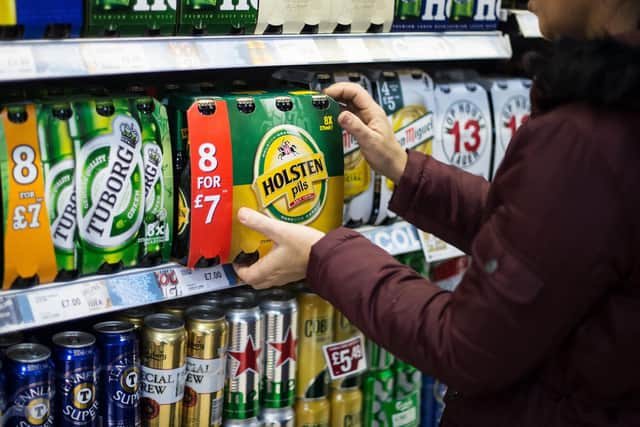Alcohol Scotland: Drink-related deaths still highest in the UK, figures reveal
Campaigners have demanded action to tackle Scotland’s continuing “alcohol emergency” as new figures showed the rate of drink-related deaths is still the highest in the UK.
Alcohol Focus Scotland, which is funded by the Scottish Government, has warned an “already overstretched NHS” could now be facing a “ticking timebomb of alcohol-related illness and deaths”. The body spoke out as new data from the Office for National Statistics (ONS) showed alcohol-specific deaths across the UK had reached a record high, with 10,048 people dying in 2022.
Advertisement
Hide AdAdvertisement
Hide AdWhile there were 16.6 deaths per 100,000 people across the UK, in Scotland the rate was higher, at 22.9 deaths per 100,000.


Speaking about the situation across the UK, David Mais, a health statistician with the ONS, said: “Alcohol-specific deaths rose sharply with the onset of the pandemic and today’s results show a continuation of that trend, with deaths around a third higher than in 2019.”
There were 1,276 deaths in Scotland in 2022 – with this the highest total since 2008 – with the latest figures showing 836 men and 440 women died as a result of alcohol.
Deaths among women were up from 361 in 2019 – an increase of almost 22 per cent – while deaths among men were up by nearly 27 per cent over the same period, rising from 659 in 2019.
Alcohol Focus Scotland said overall deaths had seen a “staggering increase of 25 per cent” since 2019.
The figures were published less than a week after MSPs agreed to increase the minimum unit price (MUP) charged for alcohol in Scotland from its existing level of 50p a unit to 65p. The Scottish Government has said the price rise, which will come into force at the end of September, will help save lives.
Alcohol Focus Scotland chief executive officer Alison Douglas said: “Despite the Scottish Government’s acknowledgement that this is a public health emergency, we are still not seeing an adequate emergency response.”
She said the latest ONS figures “confirm that despite the lifesaving impact of minimum unit pricing (MUP), Scotland remains in the grip of an alcohol emergency”.
Advertisement
Hide AdAdvertisement
Hide AdMs Douglas warned: “Changes to drinking patterns during the Covid-19 pandemic have sadly become embedded and represent a ticking timebomb of alcohol-related illness and deaths for our already over-stretched NHS.”
While the rate of alcohol-specific deaths among men reduced slightly in 2022 to 30.9 deaths per 100,000, the rate for women rose to 15.1 per 100,000 – the highest level since 2008.
Ms Douglas said: “Every life lost due to alcohol is a preventable tragedy for individuals, families, friends and communities. It is particularly concerning to note the increase in death rates for women.”
Urging the Scottish Government to act, Ms Douglas added: “It’s time we got on and implemented these essential public health policies and put people’s right to good health above the interests of big business.”
Drugs and alcohol policy minister Christina McKelvie told how research by “internationally-renowned public health experts” had estimated the “world-leading” MUP policy had “saved hundreds of lives, likely averted hundreds of alcohol-attributable hospital admissions and contributed to reducing health inequalities”.
However, she said: “Despite this progress, deaths caused specifically by alcohol rose last year – and my sympathy goes out to all those who have lost a loved one.”
Comments
Want to join the conversation? Please or to comment on this article.